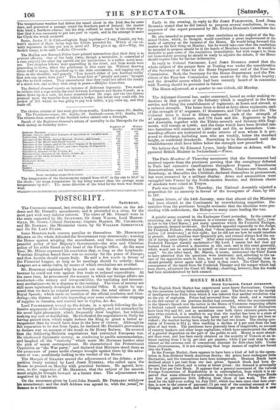A painful scene occurred in the Exchequer Court yesterday. In
the course of examining one of his own witnesses in a revenue case, Mr. Martin, Q.C., [son- in-law to the Chief Baron,] put many questions which Sir Frederick Thesiger, his opponent, deemed irrelevant. Sir Frederick appealed repeatedly to the Judge, Sir Frederick Pollock; who replied, that " these questions were open to that ob- jection [of irrelevancy) at first sight; but he did not see how he could interfere at present. Such questions were frequently put, and counsel always had the cre- dit of having some object in view." After some continuance of the contest, Sir Frederick Thesiger warmly exclaimed—" My Lord, I cannot but feel that my learned friend is allowed a discretion in this case, and in this court generally, which would not be extended to myself or other counsel in this or in any other court." On the other hand, Mr. Martin, it seems, understood the Chief Baron to have admitted that the questions were irrelevant; and, adverting to the na- ture of the opposition made to him, he turned to the Jury, declaring that he should probably never again bold a brief in that court. The Chief Baron, in consequence of the insult from Sir Frederick Thesiger and the temper which had been shown, ad;ourned the Court till Monday; observing, however, that his words had been misunderstood by both counseL


























 Previous page
Previous page